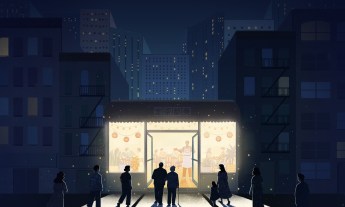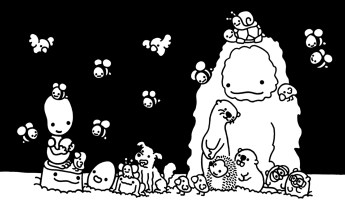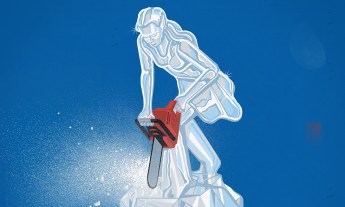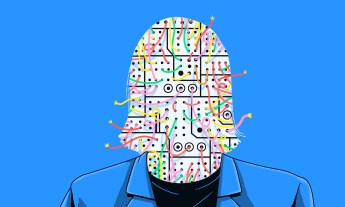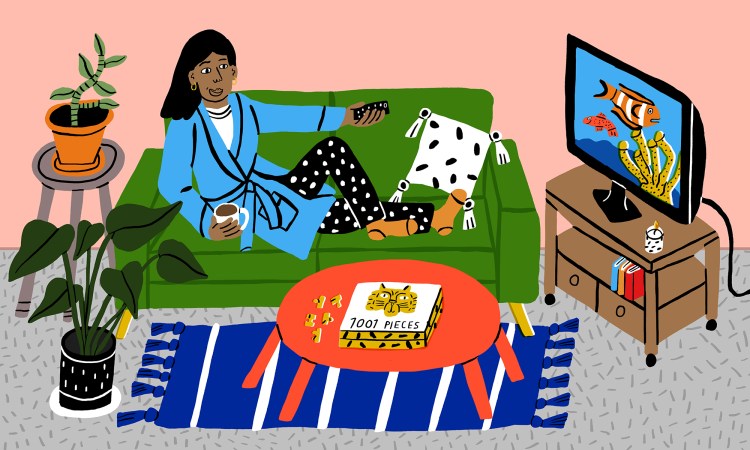
Years ago, I listened to an episode of the podcast On Being where Krista Tippett interviews writer and Buddhist teacher Sylvia Boorstein. This interview has ended up being a touchstone for me — and one that I continue to come back to — because of all the generous wisdom that Boorstein shares.
But there’s one moment in particular that came to mind as I started to think about how we regain our footing amid the disorientation and upheaval of the COVID-19 pandemic.
I’ll share it in Boorstein’s own words:
“… I was thinking about the GPS in my car. It never gets annoyed at me. If I make a mistake, it says, “Recalculating.” And then it tells me to make the soonest left turn and go back.
I thought to myself, you know, I should write a book and call it “Recalculating” because I think that that’s what we’re doing all the time, that something happens, it challenges us and the challenge is, OK, so do you want to get mad now? …There’s a fork in the road here. I could become indignant; I could flame up this flame of negativity; or I could say, “Recalculating.” I’ll just go back here.”
Right now, we are all being forced to recalculate.
We thought we were headed down one road, and that road is now closed. The very ground on which we’ve been building our lives is shifting, moment by moment. Many of us are facing very real threats and losses right now, to our health, safety, security, livelihood and family, not to mention an uncertainty around our futures and our dreams. It’s natural to feel lost in a time like this.
But we have a choice as to whether we lose ourselves to fear, anger and despair. (Not that we won’t experience these feelings — we will, of course — but we don’t have to remain mired in them.) We can stay stuck in rage at being lost, or we can gently recalculate. And recalculating is our best chance at finding our way back toward joy.
Below, I want to share some ways that you can shift your mindset and your environment to help you recalculate and find your bearings when a crisis throws you off course.
1. Be gentle
The striking thing about Boorstein’s “recalculating” metaphor to me is how gentle it is. She describes this later in the interview when she says, “And no matter how many times I don’t make that turn, it will continue to say, ‘Recalculating.’ The tone of voice will stay the same.”
The GPS doesn’t blame her. It doesn’t question her intelligence. It doesn’t ask her how she could possibly make the same mistake over and over again. It just gently begins the process of recalculating again.
In moments of crisis, we sometimes turn the harshness of the world in on ourselves. This can take the form of self-flagellation (“I’m so stupid. I should have prepared better.”), regret (“If only I hadn’t … ”), or deprivation (“I don’t deserve to feel good while others are suffering.”).
But when we do this, we make it harder for ourselves to recover. Regret and self-abuse mire our attention in the past. Rather than extracting the lesson and letting us move on, they keep us stuck rehashing our failures instead of looking toward the future.
Self-deprivation may be even worse. Depriving ourselves of physical needs and comforts reinforces the impression that we’re in an acute state of emergency, hijacking our attention and focusing it on short-term survival. Studies of people who are experiencing scarcity — of money, time, or other resources — show that the sense of not having enough leads to a distorted understanding of our situation, which in turn leads to poor decision-making.
This line of research has added a great deal of nuance to our understanding of why it can be so hard for people to get out of poverty; it’s not simply the lack of resources, but the way that deprivation itself raises psychological obstacles to effective, long-term decision-making.
As adults, we may not have anyone caring for us in the midst of this crisis. But by being gentle with ourselves, we can become our own caretakers. This begins with how we talk to ourselves. I love how Boorstein refers to herself as “sweetheart” when dealing with a challenging situation.
“Sweetheart,” she’ll say to herself, “You are in pain. Relax. Take a breath. Let’s pay attention to what is happening. Then we’ll figure out what to do.” If “sweetheart” doesn’t work for you, imagine you’re talking to a close friend or a child. How much gentler would you be with them than you usually are with yourself?
At the same time as you work to be gentle with your mind, can you also be gentle with your body? If you’ve been forcing yourself to sit in a hard chair working all day, get up and go get yourself a cushion. Sleep in a bit, or nap. Resist the temptation to deprive yourself of enjoyment right now. Let yourself eat some of the treats you’ve been baking for your family. Give yourself the gift of a bit of abundance, even if that’s only the quantity of bubbles in your bathtub.
2. Reach out and touch something
There’s some research to suggest that when we’re in a negative emotional state, such as anxiety or sadness, we’re more attuned to tactile stimuli. By contrast, when we’re in a positive state, we’re more attuned to the visual qualities of our environment.
This research builds on animal models of behavior, which posit an evolutionary explanation: Positive emotions usually accompany environmental conditions that are safe and it makes sense to explore the environment; being sensitive to visual cues inspires us to venture out and do just that.
But when circumstances are unsafe or uncertain, it makes sense to stay close to the nest, to huddle together with loved ones, so our brains focus our attention on tactile sensations — such as warmth, softness — to facilitate this behavior.
Given this, in times of crisis, joy and comfort might be best received in tactile form. Since human touch is harder to come by, adding texture to our spaces could be a good way to create a sense of security and gentleness. Maybe that means fuzzy slippers or a new robe. (I’ve spent my whole life hating robes, but just bought one and can’t seem to take it off!)
Maybe it means getting new pillowcases, or putting a sheepskin on the floor by your bed so that the first thing your feet touch in the morning is soft. These might feel like indulgences right now, but they’re small ones. And anything that makes us feel nurtured and safe right now has value.
Alternatively, just moving items around could create the same effect. Draping a blanket over your work chair or wearing your softest cardigan might be enough to give your daily routines a tactile boost.
3. Accept that you are lost
Say it out loud with me: “I feel lost.”
Rob Bell has a podcast on this topic, one I listened to during a particularly uncertain and fear-filled moment of my life. It was last summer, after we had just finished our fourth cycle of IVF, and we were waiting for the results of the embryo tests. After three cycles that had ranged from disappointing to devastating, I was trying to remain buoyant — but the long wait filled me with dread. I felt unable to focus and unable to plan, stuck in a moment that was alternately hopeful and bracing.
So when I heard Bell say that sometimes in these moments the very best thing to do is just to say, “I feel lost,” I tried it. Immediately, I felt a sense of relief. Suddenly, I wasn’t trying to get back to a place I knew — I was able to see that I was in new terrain, and began to be curious about it.
When we fight the idea of being lost, we’re unable to do anything about it. We can’t recalculate the route if some part of us believes we’re still on the path. (You know this if you’ve ever been physically lost, especially if you’re with someone who still believes they’re going the right direction. Until you convince that person that you’re headed west when you’re supposed to be going south, you can’t even begin to get there.)
But when we accept that we’re lost, we shift from knowing to listening. We stop moving for a moment and we take stock of where we are. We open up our senses and we reconnect with our intuition. These are things that can be hard to do when we’re whizzing through the world on a well-trodden path. In the wild, this might mean looking for where the moss is growing on trees or the position of the sun.
It might mean asking ourselves, which way do we think is the way out? In life, it might mean doing this in a metaphorical sense: Looking for the markers that define the new landscape you’ve ended up in, and might indicate what direction you want to move in.
In this receptive state, we’re much more alert to options and opportunities. For me, acknowledging I’m lost immediately releases the fear and often ignites a rush of ideas. I’m less risk-averse, more open-minded and experimental. So while fighting being lost keeps me stuck, acceptance is often a quick trigger to get me into action again.
4. Firm up your foundation
We humans like to feel in control and in balance, and there’s nothing like a crisis to make us feel like we have neither. But focusing on our immediate surroundings can help us regain some equilibrium. Organizing your pantry, straightening your bookshelves, leveling your art, tightening loose bolts and handles — these things can help make a home feel more symmetrical and solid, a haven from the chaotic world outside our doors.
And if you can’t bring yourself to take on a project like this right now, look to bring some harmony or order to your leisure time. Studies have shown coloring in a mandala can reduce stress, and playing Tetris can help reduce the incidence of flashbacks among people suffering from post-traumatic stress disorder. Interestingly, you don’t have to be good at these activities for them to be effective; score had no correlation to benefit gained in the study.
What mandalas and Tetris have in common is that they impose order on a disorderly situation. We know from a range of research that physical disorder in environments can lead to antisocial behaviors ranging from littering to vandalism to cheating and that neighborhoods with high disorder are associated with increased depression and anxiety.
So imposing order, whether in the physical world or the virtual one, seems to be a way to recover a bit of stability. You could also try a jigsaw puzzle or a game I’ve recently discovered, I Love Hue, which asks you to arrange squares of color into pleasing gradient grids.
5. Break your worry loops
One of the problems with crisis situations is that they have a tendency to create worry loops in our minds. This very nonscientific term is better known as rumination, and it feels like your mind is stuck in a spin cycle of anxiety, turning the same worries over and over again to examine them from every angle.
Worry loops are incredibly draining, and they’re also counterproductive, because rather than leading us toward any productive action, they tend to keep us stuck in disaster fantasies and analysis. As Esther Hicks says, “Worrying is using your imagination to create something you don’t want.”
How do we break worry loops? According to research, one of the best ways is to get exposure to nature. Being in nature quiets a part of the brain, the subgenual prefrontal cortex, that tends to ruminate and brood over problems. If you have safe access to the outdoors, get there, and spend some time sitting or walking in nature.
If you don’t, you may be able to get some of the same benefits through simulated nature. Stream the Planet Earth series or any nature documentary. Play birdsongs, which have been shown to ease tension and anxiety. Add houseplants or cut greenery to the spaces where you spend the most time.
Another thing that can help break worry loops is play. Play is an absorbing activity, one that pulls us into the present and makes us briefly forget our troubles. Breaking out a board game, playing catch, or building a pillow fort — these activities provide a form of relief that goes beyond momentary relief. Letting go of your worry loops, even temporarily, can create space for more expansive thinking, the kind that can help you pay attention to glimmers of hope and possibility that you might otherwise miss amid the darkness.
Many posts and articles are urging people to make productive use of their time during this socially distanced era: to take up a creative hobby, develop a new side hustle, host Zoom parties, reconnect with old friends, cook elaborate recipes or learn a new skill.T These are all valid uses of your time if you have the energy for them.
But it’s important to recognize that we are all going through a major, once-in-a-generation catastrophe, one that we can’t quite see our way out of yet.
It’s reasonable to be disoriented. It’s reasonable to be more tired than usual. It’s reasonable to question the path you were on before this began, even if you’re healthy, safe and still able to make a living.
I suppose what I’m saying is that the need to recalculate isn’t a weakness. Rather, it’s a strength, one that can help us come out of a crisis more resilient than we came into it. And perhaps, headed in a better direction than we were before.
This post was originally published on The Aesthetics of Joy site.
Watch her TED Talk here:








